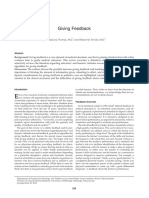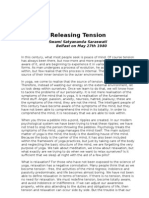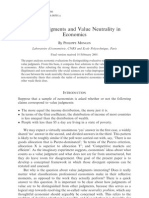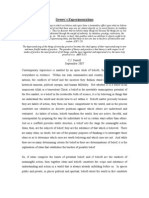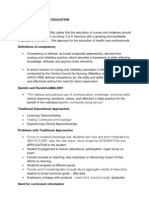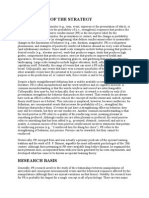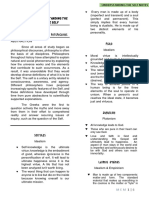Social Cognitive Theory: What Is Self-Efficacy?
Social Cognitive Theory: What Is Self-Efficacy?
Uploaded by
kerang73Copyright:
Available Formats
Social Cognitive Theory: What Is Self-Efficacy?
Social Cognitive Theory: What Is Self-Efficacy?
Uploaded by
kerang73Original Description:
Original Title
Copyright
Available Formats
Share this document
Did you find this document useful?
Is this content inappropriate?
Copyright:
Available Formats
Social Cognitive Theory: What Is Self-Efficacy?
Social Cognitive Theory: What Is Self-Efficacy?
Uploaded by
kerang73Copyright:
Available Formats
The concept of self-efficacy lies at the center of psychologist Albert Banduras social cognitive theory.
Banduras theory emphasizes the role of observational learning, social experience, and reciprocal
determinism in the development of personality.
According to Bandura, a persons attitudes, abilities, and cognitive skills comprise what is known as the
self-system. This system plays a major role in how we perceive situations and how we behave in
response to different situations. Self-efficacy plays is an essential part of this self-system.
What Is Self-Efficacy?
According to Albert Bandura, self-efficacy is "the belief in ones capabilities to organize and execute the
courses of action required to manage prospective situations." In other words, self-efficacy is a persons
belief in his or her ability to succeed in a particular situation. Bandura described these beliefs as
determinants of how people think, behave, and feel (1994).
Since Bandura published his seminal 1977 paper, "Self-Efficacy: Toward a Unifying Theory of Behavioral
Change," the subject has become one of the most studied topics in psychology. Why has self-efficacy
become such an important topic among psychologists and educators? As Bandura and other researchers
have demonstrated, self-efficacy can have an impact on everything from psychological states to behavior
to motivation.
The Role of Self-Efficacy
Virtually all people can identify goals they want to accomplish, things they would like to change, and
things they would like to achieve. However, most people also realize that putting these plans into action
is not quite so simple. Bandura and others have found that an individuals self-efficacy plays a major role
in how goals, tasks, and challenges are approached.
People with a strong sense of self-efficacy:
View challenging problems as tasks to be mastered
Develop deeper interest in the activities in which they participate
Form a stronger sense of commitment to their interests and activities
Recover quickly from setbacks and disappointments
People with a weak sense of self-efficacy:
Avoid challenging tasks
Believe that difficult tasks and situations are beyond their capabilities
Focus on personal failings and negative outcomes
Quickly lose confidence in personal abilities
Sources of Self-Efficacy
How does self-efficacy develop? These beliefs begin to form in early childhood as children deal with a
wide variety of experiences, tasks, and situations. However, the growth of self-efficacy does not end
during youth, but continues to evolve throughout life as people acquire new skills, experiences, and
understanding.
According to Bandura, there are four major sources of self-efficacy.
1. Mastery Experiences
"The most effective way of developing a strong sense of efficacy is through mastery experiences,"
Bandura explained. Performing a task successfully strengthens our sense of self-efficacy. However, failing
to adequately deal with a task or challenge can undermine and weaken self-efficacy.
2. Social Modeling
Witnessing other people successfully completing a task is another important source of self-efficacy.
According to Bandura, "Seeing people similar to oneself succeed by sustained effort raises observers'
beliefs that they too possess the capabilities master comparable activities to succeed."
3. Social Persuasion
Bandura also asserted that people could be persuaded to believe that they have the skills and
capabilities to succeed. Consider a time when someone said something positive and encouraging that
helped you achieve a goal. Getting verbal encouragement from others helps people overcome self-doubt
and instead focus on giving their best effort to the task at hand.
4. Psychological Responses
Our own responses and emotional reactions to situations also play an important role in self-efficacy.
Moods, emotional states, physical reactions, and stress levels can all impact how a person feels about
their personal abilities in a particular situation. A person who becomes extremely nervous before
speaking in public may develop a weak sense of self-efficacy in these situations.
However, Bandura also notes "it is not the sheer intensity of emotional and physical reactions that is
important but rather how they are perceived and interpreted." By learning how to minimize stress and
elevate mood when facing difficult or challenging tasks, people can improve their sense of self-efficacy.
References: Bandura, A. (1977). Self-efficacy: Toward a unifying theory of behavioral change. Psychological Review, 84, 191215.
Bandura, A. (1992) Exercise of personal agency through the self-efficacy mechanisms. In R. Schwarzer (Ed.), Self-efficacy:
Thought control of action. Washington, DC: Hemisphere.
Bandura, A. (1994). Self-efficacy. In V. S. Ramachaudran (Ed.), Encyclopedia of human behavior,4. New York: Academic Press,
pp. 71-81.
Bandura, A. (1995). Self-Efficacy in Changing Societies. Cambridge University Press.
You might also like
- Thomas & Arnold, Giving Feedback, 2011Document7 pagesThomas & Arnold, Giving Feedback, 2011Ronii SzékelyNo ratings yet
- Measuring Concept. Barbara BryneDocument5 pagesMeasuring Concept. Barbara BryneIon BucurNo ratings yet
- The BestDocument43 pagesThe BestFrank Valenzuela100% (8)
- The Learning OrganizationsDocument12 pagesThe Learning OrganizationsadaltoparadaNo ratings yet
- Sociology of SelfDocument10 pagesSociology of SelfEghweree Ogheneruonah CharlesNo ratings yet
- James Waller Pme 832 - Theory in Practice AssignmentDocument6 pagesJames Waller Pme 832 - Theory in Practice Assignmentapi-450537948No ratings yet
- 4 FMDocument2 pages4 FMisaiahbagaNo ratings yet
- Psychology of EfficacyDocument3 pagesPsychology of EfficacyScott BramerNo ratings yet
- Chapter 3Document33 pagesChapter 3Grigoras Elena DianaNo ratings yet
- The Salutogenic Model As A Theory To Guide Health PromotionDocument8 pagesThe Salutogenic Model As A Theory To Guide Health PromotionPedroNo ratings yet
- FREDRICKSON, B. What Good Are Positive Emotion PDFDocument20 pagesFREDRICKSON, B. What Good Are Positive Emotion PDFUlisses CaetanoNo ratings yet
- Releasing Tension: Swami Satyananda Saraswati Belfast On May 27th 1980Document6 pagesReleasing Tension: Swami Satyananda Saraswati Belfast On May 27th 1980Martian MartieNo ratings yet
- Transfer of Learning - PPT FinalDocument10 pagesTransfer of Learning - PPT FinalRenee LeMieuxNo ratings yet
- Introduction To Social Dimensions of EducationDocument29 pagesIntroduction To Social Dimensions of Educationnimfa villamor100% (1)
- Reflection and Practice: Dr. Maria ChristodoulouDocument13 pagesReflection and Practice: Dr. Maria Christodoulouchaklush100% (1)
- A Johari Window Is A Cognitive Psychological Tool Created byDocument6 pagesA Johari Window Is A Cognitive Psychological Tool Created bybookworm215No ratings yet
- Tating, Marvel E. Bsit - 3E 1. Define The Ff. and Give Examples. Exploratory ResearchDocument7 pagesTating, Marvel E. Bsit - 3E 1. Define The Ff. and Give Examples. Exploratory ResearchMarvel TatingNo ratings yet
- Bachelor of Arts Behavioural ScienceDocument26 pagesBachelor of Arts Behavioural ScienceSorinel BalanNo ratings yet
- Educ 5312-Research Paper - Samir AhmadovDocument4 pagesEduc 5312-Research Paper - Samir Ahmadovapi-302415858No ratings yet
- Understanding Self Components of Self Self Concept Self Confidence Self Image Sabnam BasuDocument28 pagesUnderstanding Self Components of Self Self Concept Self Confidence Self Image Sabnam BasuRoldan Dela Cruz100% (2)
- Consensus TheoryDocument3 pagesConsensus TheoryGlenn Puralan FloresNo ratings yet
- And Transformation (Smart), Cecilia L. W. Chan PHD, Timothy H. Y. Chan Bcogsc & Siv Man NG RCMP (2008)Document5 pagesAnd Transformation (Smart), Cecilia L. W. Chan PHD, Timothy H. Y. Chan Bcogsc & Siv Man NG RCMP (2008)Pooja VarmaNo ratings yet
- Value JudgementDocument30 pagesValue JudgementShen WilliamNo ratings yet
- Asking For HelpDocument10 pagesAsking For HelpdeviNo ratings yet
- How To Develop Emotional Intelligence - IHHPDocument7 pagesHow To Develop Emotional Intelligence - IHHPAmardeep KumarNo ratings yet
- Transformative LearningtheoryDocument15 pagesTransformative Learningtheoryapi-339753830No ratings yet
- Qualitative Vs QuanitativeDocument8 pagesQualitative Vs Quanitativenian6789No ratings yet
- QL 50otldYZDocument2 pagesQL 50otldYZVicenç Márquez MasNo ratings yet
- Issues and Insights Multicultural Learning and TeachingDocument9 pagesIssues and Insights Multicultural Learning and TeachingIlene Dawn AlexanderNo ratings yet
- Dewey's Experimentalism: C.J. Sentell September 2007Document29 pagesDewey's Experimentalism: C.J. Sentell September 2007C.J. Sentell100% (2)
- Competency Based Education....... AmritaDocument3 pagesCompetency Based Education....... AmritaGurinder GillNo ratings yet
- Educational PhilosophyDocument3 pagesEducational Philosophyapi-527571126No ratings yet
- Research Paper: Prochaska's Transtheoretical Model of Change and Its Application To CoachingDocument12 pagesResearch Paper: Prochaska's Transtheoretical Model of Change and Its Application To CoachingInternational Coach AcademyNo ratings yet
- Mental Health Is A Positive Concept Related To The Social and Emotional Wellbeing of Individuals and CommunitiesDocument4 pagesMental Health Is A Positive Concept Related To The Social and Emotional Wellbeing of Individuals and CommunitiesGelsey Claudette Ortega ReyesNo ratings yet
- Living A Balanced LifeDocument17 pagesLiving A Balanced LifeAbdul Rahman Khan MohammadNo ratings yet
- Module 2 For Week 2Document3 pagesModule 2 For Week 2Khianna Kaye PandoroNo ratings yet
- Article 1 - Learing TheoriesDocument5 pagesArticle 1 - Learing TheoriesKavitha AlwisNo ratings yet
- Guided Imagery Strategy: Things Fall ApartDocument2 pagesGuided Imagery Strategy: Things Fall ApartIm NurulNo ratings yet
- Personal TransformationDocument320 pagesPersonal TransformationChidambaram100% (1)
- The Science of Leading Yourself (Wiley W. Souba, 2013) PDFDocument11 pagesThe Science of Leading Yourself (Wiley W. Souba, 2013) PDFFrancyn Rossi YangsonNo ratings yet
- A Study On Academic Stress of Higher Secondary School StudentsDocument9 pagesA Study On Academic Stress of Higher Secondary School StudentsAnonymous CwJeBCAXp100% (1)
- Coping With Stress in Middle and Late AdolescenceDocument2 pagesCoping With Stress in Middle and Late Adolescencejian.ryccNo ratings yet
- The Ultimate EducatorDocument14 pagesThe Ultimate EducatorAlexander Antonio Ortega AlvarezNo ratings yet
- Rudolph Dreikurs: "Children Need Encouragement Like A Plant Needs Water."Document16 pagesRudolph Dreikurs: "Children Need Encouragement Like A Plant Needs Water."MornisaNo ratings yet
- Religion and Morality Lecture Note EditedDocument27 pagesReligion and Morality Lecture Note EditedDavid Oba OlayiwolaNo ratings yet
- Research QuestionDocument6 pagesResearch QuestionAlfian Ardhiyana PutraNo ratings yet
- The Importance of Career Adaptability, Career Resilience, and Employability in Designing A Successful LifeDocument18 pagesThe Importance of Career Adaptability, Career Resilience, and Employability in Designing A Successful LifeAgung PrasetyaNo ratings yet
- Robert eDocument15 pagesRobert esulthanramizNo ratings yet
- Clinical Supervision in Nursing (Widyawati)Document17 pagesClinical Supervision in Nursing (Widyawati)Rarasati SrimurniNo ratings yet
- Relax! You'll Be More Productive - NYTimesDocument4 pagesRelax! You'll Be More Productive - NYTimesarasanabcNo ratings yet
- Learning Theories: Behaviorism, Cognitivism, ConstructivismDocument7 pagesLearning Theories: Behaviorism, Cognitivism, ConstructivismJb-rn Cacho BasanezNo ratings yet
- The Emergence of Self in Educational ConDocument239 pagesThe Emergence of Self in Educational ConRamon CunhaNo ratings yet
- Developing A Sense of Belonging': Guglielmo Volpe Economics Department Queen Mary, University of LondonDocument19 pagesDeveloping A Sense of Belonging': Guglielmo Volpe Economics Department Queen Mary, University of LondonGita Yolanda100% (1)
- Challenges of Student LifeDocument19 pagesChallenges of Student LifeNazir KhanNo ratings yet
- Chapter 2 - Benefit of Outdoor EducationDocument17 pagesChapter 2 - Benefit of Outdoor EducationNUR AINA NAZWA ABDULLAH (BG)No ratings yet
- Newsletter-Counseling 10-26-18 FrontDocument2 pagesNewsletter-Counseling 10-26-18 Frontapi-339302820No ratings yet
- How To Practice Mindfulness Meditation PDFDocument1 pageHow To Practice Mindfulness Meditation PDFBernardita BordagorryNo ratings yet
- Chapter 9, 10, & 11 Intrapersonal, Academic, & Social Life SkillsDocument14 pagesChapter 9, 10, & 11 Intrapersonal, Academic, & Social Life SkillseyobgashawNo ratings yet
- Innovative Teaching Methods in Science Education ForDocument10 pagesInnovative Teaching Methods in Science Education Forpreston xxx perolenaNo ratings yet
- Positive ReinforcementDocument6 pagesPositive Reinforcementiulia9gavrisNo ratings yet
- Self Efficacy (What It Is and Why It Matters)Document3 pagesSelf Efficacy (What It Is and Why It Matters)ABDUL RAUF100% (1)
- Self EfficacyDocument4 pagesSelf EfficacySainaath Jandhhyaala100% (1)
- Mark Ah 2015Document2 pagesMark Ah 2015kerang73No ratings yet
- My Hobby My Name Is I Am Eight Years Old. I Have A Hobby. My Hobby Is Reading. I Like To Read StorybooksDocument1 pageMy Hobby My Name Is I Am Eight Years Old. I Have A Hobby. My Hobby Is Reading. I Like To Read Storybookskerang73No ratings yet
- PK01/3 Format Laporan ProgramDocument2 pagesPK01/3 Format Laporan Programkerang73No ratings yet
- What Will I BeDocument1 pageWhat Will I Bekerang73No ratings yet
- Goal Theory - Reward & MotivationDocument2 pagesGoal Theory - Reward & Motivationkerang73No ratings yet
- Cinderella Has: Let's Read and Match. 1. She Has Big Eyes and Wears A Gold Tiara. 2. SheDocument1 pageCinderella Has: Let's Read and Match. 1. She Has Big Eyes and Wears A Gold Tiara. 2. Shekerang73No ratings yet
- Healthy Food. Fruit Food PyramidDocument1 pageHealthy Food. Fruit Food Pyramidkerang73No ratings yet
- Tuanku Abdul Rahman Ibni Almarhum Tuanku MuhammadDocument15 pagesTuanku Abdul Rahman Ibni Almarhum Tuanku Muhammadkerang73No ratings yet
- Academic - Regis.Edu/Tharring/Ppt/Leadership/06 PowerpointDocument1 pageAcademic - Regis.Edu/Tharring/Ppt/Leadership/06 Powerpointkerang73No ratings yet
- (13. f4 Qc5+14. Kh1 Qxc4) (24. Qxe4 Qxe4+25. Nxe4 Rxh126. Rxh1 Bd5 27. Kf3 27... f5)Document1 page(13. f4 Qc5+14. Kh1 Qxc4) (24. Qxe4 Qxe4+25. Nxe4 Rxh126. Rxh1 Bd5 27. Kf3 27... f5)kerang73No ratings yet
- W1 MPF 1563 1Document1 pageW1 MPF 1563 1kerang73No ratings yet
- Terminology in Psychology Competitive Exams Part 1 PsychologyDocument3 pagesTerminology in Psychology Competitive Exams Part 1 PsychologyKNOW INDIANo ratings yet
- Psychoanalytic Theory: (Sigmund Freud)Document10 pagesPsychoanalytic Theory: (Sigmund Freud)Trixie MalinaoNo ratings yet
- REBT - Windy Dryden PDFDocument17 pagesREBT - Windy Dryden PDFTatu NicoletaNo ratings yet
- Psychotherapy ReportDocument7 pagesPsychotherapy ReportEileen Medina CostoNo ratings yet
- Talking To Children About Illness PDFDocument5 pagesTalking To Children About Illness PDFJorge MartínezNo ratings yet
- OB CaseStudy 1Document4 pagesOB CaseStudy 1Navneesh TyagiNo ratings yet
- Behavior Management Through AdventureDocument5 pagesBehavior Management Through AdventureInese BerzinaNo ratings yet
- PSY 101.course Outline, Summer '16Document6 pagesPSY 101.course Outline, Summer '16Sayed AlamNo ratings yet
- MP012 1001 Motivational Quotes For Success Great Quotes From Great MindsDocument164 pagesMP012 1001 Motivational Quotes For Success Great Quotes From Great MindsRajesh100% (3)
- A Z of NLP PDFDocument9 pagesA Z of NLP PDFViseshNo ratings yet
- Citta, Mano, Vinnana - A Psycho-Semantic InvestigationDocument52 pagesCitta, Mano, Vinnana - A Psycho-Semantic InvestigationGuhyaprajñāmitra3No ratings yet
- Joshua Pellicer - Potential ThreatDocument171 pagesJoshua Pellicer - Potential Threatfeowfeow100% (1)
- Module 1 - L1 L4Document6 pagesModule 1 - L1 L4Vanessa BelarNo ratings yet
- Ejercicios para Escala TonalDocument8 pagesEjercicios para Escala TonalinorkannabelleNo ratings yet
- A Study of The Existential Meaning of Secondary School Teachers in Relation To Their Gender and Work ExperienceDocument6 pagesA Study of The Existential Meaning of Secondary School Teachers in Relation To Their Gender and Work ExperienceAnonymous CwJeBCAXpNo ratings yet
- Icke David - Human Race Get Off Your KneesDocument747 pagesIcke David - Human Race Get Off Your KneesLaura Sakina López Gámez100% (3)
- D.H LawrenceDocument9 pagesD.H Lawrenceminh_ec90No ratings yet
- How To Achieve TranquilityDocument3 pagesHow To Achieve TranquilityWinnie MandelaNo ratings yet
- On Mind and Body Autogenic Training Self Empowerment PerformersDocument6 pagesOn Mind and Body Autogenic Training Self Empowerment PerformersAisyahMKNo ratings yet
- OshoDocument1 pageOshospirit571No ratings yet
- J. G. Fichte, 'An Attempt at A New Presentation of The Wissenschaftslehre' Ch. OneDocument17 pagesJ. G. Fichte, 'An Attempt at A New Presentation of The Wissenschaftslehre' Ch. OneCdxgugihiNo ratings yet
- Psychomotor Physiotherapy BrochureDocument3 pagesPsychomotor Physiotherapy BrochureرونقالحياةNo ratings yet
- Kognitivno Bihevioralna Terapija Za PsihozuDocument108 pagesKognitivno Bihevioralna Terapija Za PsihozuDragutin PetrićNo ratings yet
- Developing A Positive Self ConceptDocument2 pagesDeveloping A Positive Self ConceptRyhea ViernesNo ratings yet
- Level of Extrinsic Motivation Practices of Kmia Teachers and Its Effect To Thegrade Vi Pupils of Khadijah Mohammad Islamic Academy FOR A.Y 2014-2015Document57 pagesLevel of Extrinsic Motivation Practices of Kmia Teachers and Its Effect To Thegrade Vi Pupils of Khadijah Mohammad Islamic Academy FOR A.Y 2014-2015Mohammad Ali MaunaNo ratings yet
- FIRO-B NotesDocument2 pagesFIRO-B NotesSnehashish BhosaleNo ratings yet
- The Origin and Conservation of Self-Consciousness - Reflections On Four Questions by Heinz Von FoersterDocument37 pagesThe Origin and Conservation of Self-Consciousness - Reflections On Four Questions by Heinz Von FoersterTatafreiheitNo ratings yet
- Solutions of Mock CAT - 23 (CAT 2015 Pattern) : Scorecard Accuracy Qs Analysis Booster Analysis Video AnalysisDocument76 pagesSolutions of Mock CAT - 23 (CAT 2015 Pattern) : Scorecard Accuracy Qs Analysis Booster Analysis Video AnalysisshreyaNo ratings yet
